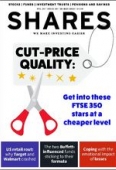Archived article
Please note that tax, investment, pension and ISA rules can change and the information and any views contained in this article may now be inaccurate.
How Buffettology and Free Spirit funds can bounce back from underperformance

Sanford DeLand’s CFP SDL UK Buffettology (BF0LDZ3) and CFP SDL Free Spirit (BYYQC27) funds have forged top-notch long-term performance records since respective launches in 2011 and 2017 thanks to the unwavering pursuit of ‘Business Perspective Investing’, a quality-focused approach championed by ‘Sage of Omaha’ Warren Buffett and Charlie Munger.
Unusually however, both portfolios managed by Sanford DeLand’s chief investment officer Keith Ashworth-Lord have lagged in the IA UK All Companies sector of late. A first quartile performer over five years according to Trustnet, Buffettology is fourth quartile over three years, one year and the last six months, whereas Free Spirit, first quartile over three and five years, is now fourth quartile over the last one, three and six month periods.
Given this reversal of fortunes, Shares recently jumped at the opportunity to meet Sanford DeLand’s chief analyst Eric Burns, who works alongside seasoned Business Perspective Investing practitioner Ashworth-Lord and leads the stock research process for both portfolios.
Burns recently returned with the rest of the Sanford DeLand investment team from Berkshire Hathaway’s (BRK.B) annual shareholder meeting (30 April) in Nebraska, where the main draw was the Q&A session with Buffett and Munger.
The first in-person AGM since 2019 allowed the Sanford DeLand team to imbibe Buffett’s wisdom once again and reminded them why they shut out extraneous noise from their process and concentrate on the quality of the businesses they buy and the price they pay for them. They view market volatility as the friend of the true long- term investor.
FOURTH QUARTILE DISAPPOINTMENT
Nevertheless, Burns was keen to explain the key reasons for the funds’ lacklustre recent showing in a market that has fretted over everything from inflation and rising interest rates to war in Ukraine in 2022 so far. ‘Everywhere you look there are reasons for people to feel downbeat,’ said Burns.
Year-to-date, the performance of both funds has been fourth quartile, but he points out ‘that’s quite unusual for both funds because over the longer term, you’ll see that they are very nearly top of the pile’.
WHAT’S GONE WRONG?
So why is Sanford DeLand’s approach no longer working? ‘The answer is it is still working,’ stresses Burns. ‘It’s more about what we’re not invested in in this market than what we are invested in.’ Oil and gas, miners and banks have been driving the market, three sectors Sanford DeLand doesn’t touch.
‘We never have and never will do,’ explains Burns. ‘Everything we do conforms to Business Perspective Investing, and nothing in those sectors fits.’ Oil and gas company earnings are dependent on the oil price over which they have no control, so there is no way to predict their returns.
Having no oil and gas or mining names is quite helpful from an ESG perspective, confirms Burns, but that’s not the reason the funds avoid them. Rather, it ‘that Business Perspective Investing overlay that restricts them’. In the case of banks, Burns and Ashworth-Lord look for a high return on equity (ROE) from their investments and ‘when you strip out the leverage of the banks, how their balance sheets work, the returns are woeful’, argues Burns.
COMPOUNDERS HAVE DE-RATED
The second performance headwind is that ‘quality growth compounders have de-rated over the last six months. When you look at the sort of things in our portfolio, they tend to be quality, cash generative businesses that have been in the eye of the storm. Things that might have traded on PEs (price to earnings ratios) of 35-to-40 six months ago are now back to sort of 25 times and that’s done a lot of the damage to portfolio performance,’ laments Burns.
Yet with ‘literally a handful of exceptions’, he said companies in the two portfolios are continuing to deliver ‘really good results for us, either in line or slightly better’. Those that have fallen short and paid a price for it include Free Spirit-owned Dotdigital (DOTD:AIM), the marketing platform which ‘downgraded an expectation, still to grow, but not as ambitious as expected and paid a massive price in terms of a de-rating’, as well as Buffettology-owned RWS (RWS:AIM), the language services and technology company which issued a ‘slightly underwhelming’ update in April ahead of attracting private equity interest. ‘The key takeaway is our companies are continuing to deliver for us operationally and we could far rather it be that way round than the other way round’, adds Burns.
SAFETY FIRST
With money ‘flowing out of equities generally’, Ashworth-Lord and Burns have been more defensive with the portfolios in the first quarter, ‘because the last thing you want to do is be a forced seller in this market. We have managed the cash positions quite well. Free Spirit at the end of the month was around 10%, its around 9% currently, so there is a bit of a safety-first element there’.
Intriguingly, Burns says the watchlist of companies the team would like to own is ‘swelling almost by the day’, but ‘we are not at the point yet where we are pulling the trigger on that because we’ve got to make sure we have the liquidity at the time we need it. We’re not calling the market, but Keith and I are of the view that this shakeout may have further to go before it definitively turns, so there’s a safety-first approach.’
REDUCING THE OVERLAP
One criticism some investors have aimed at Sanford DeLand is the funds are too similar, so why bother holding both? Are they sufficiently different? ‘If you’d have asked me that question two years ago, I would have said probably not,’ explains Burns. ‘There was a lot of overlap. At the peak under (Free Spirit’s) previous manager, there was over 30% of net asset value overlap between the two, but we’ve worked quite hard over the last 12 months to reduce that overlap.’
One example is Free Spirit’s recent exit from Craneware (CRW:AIM), the software firm held in Buffettology. Following this disposal, the funds have only three common holdings; information services group RELX (REL), London Stock Exchange (LSEG) and fantasy miniatures maker Games Workshop (GAW). The NAV overlap has reduced to ‘about 8% and you should expect that to further decrease over time. That’s a strategic aim.’
INVEST IN THE BEST
Prospective investors should note both are concentrated portfolios, with 31 names in Buffettology and just 26 holdings in Free Spirit, the smaller of the two at £97.4 million versus just below £1.2 billion of assets for Buffettology, and able to invest further down the market cap spectrum as a result. Free Spirit has held up better of late by dint of having slightly higher cash levels. But the key point is both funds are skewed towards cash-generative, profitable, high-quality names able to withstand a downturn. Ashworth-Lord and Burns take the view businesses with strong balance sheets and proven business models are likely to emerge in an even better competitive position at the other side of any downswing in economic fortunes. ‘In short, the strong get stronger,’ said Ashworth-Lord in his May 2022 Free Spirit factsheet commentary.
Besides Games Workshop, Buffettology owns names ranging from drinks giant Diageo (DGE) to video games developer Team17 (TM17:AIM) to overseas name Berkshire Hathaway and fund manager Liontrust (LIO) and has recently seen bids for home repair specialist Homeserve (HSV) and RWS.
Free Spirit offers exposure to Harry Potter publisher Bloomsbury (BMY) and natural extracts-to-ingredients supplier Treatt (TET) to high-flying Calnex Solutions (CLX:AIM), a test and measurement solutions provider for the telecommunications sector, not to mention software reseller Bytes Technology (BYIT).
Burns is a big fan of longstanding Buffettology constituent Jet2 (JET2:AIM), the airline-to-packaged holidays play ‘doing something a bit special, a bit different’, which also has pricing power, crucial in an inflationary environment. Jet2’s economic moat is that it operates ‘from secondary and tertiary airports round the UK, so you’ll never see it at Heathrow, but you will see it at Leeds, Bradford or Newcastle, airports where the established carriers have had limited penetration’. Then there’s the customer service – ‘they have enhanced their brand power over the last years undoubtedly. There’s a real brand loyalty thing with Jet2. And its not just with the holidaymaker, it is with the hotel owners as well,’ says Burns.
Sanford DeLand explains Business Perspective Investing
Business Perspective Investors start from the premise that there is no philosophical distinction between part ownership (i.e. buying shares in a company) and outright ownership (i.e. buying the business in its entirety). All we are looking for is pieces of businesses to buy at the right price.
Among the selection criteria for investments are that:
– Their business model is easily comprehensible;
– They produce transparent financial statements;
– They demonstrate consistent operational performance with earnings being relatively predictable;
– They generate high returns on capital employed;
– They convert a high proportion of accounting earnings into free cash;
– Their balance sheet is strong without unduly high financial leverage;
– Their management is focused on delivering shareholder value and is candid with the owners of the business;
– Their growth strategy is more likely to rely on organic initiatives than frenetic acquisition activity.
Source: Sanford DeLand
Important information:
These articles are provided by Shares magazine which is published by AJ Bell Media, a part of AJ Bell. Shares is not written by AJ Bell.
Shares is provided for your general information and use and is not a personal recommendation to invest. It is not intended to be relied upon by you in making or not making any investment decisions. The investments referred to in these articles will not be suitable for all investors. If in doubt please seek appropriate independent financial advice.
Investors acting on the information in these articles do so at their own risk and AJ Bell Media and its staff do not accept liability for losses suffered by investors as a result of their investment decisions.
Issue contents
Feature
- What to do when one of your investments goes wrong
- Cut-price quality: Get into these FTSE 350 stars at a cheaper level
- Why Indivior shares have risen six-fold in two years
- How Buffettology and Free Spirit funds can bounce back from underperformance
- Emerging markets: Views from the experts
- How does China’s growth target for 2022 compare with the rest of the world?
Great Ideas
- Rampant CentralNic growth not being fairly reflected in the share price
- Homeserve takeover looks a done deal but there is a chance of a counterbid
- Future is an undervalued growth company with a unique business model
- Euromoney enjoys strong recovery with results set to beat expectations
- Strong demand and limited supply are driving solid growth at Tritax Eurobox
- Why investors should stick with SSE despite windfall tax concerns
News
- Oh Snap! Share price plunge reflects an advertising slowdown
- Why Deere shares fell 14% despite lifting profit guidance
- S&P 500 tips a toe into bear territory, but what should investors expect next?
- A new government survey suggests hybrid working is firmly here to stay
- Why US retail titans dragged down Wall Street

 magazine
magazine








